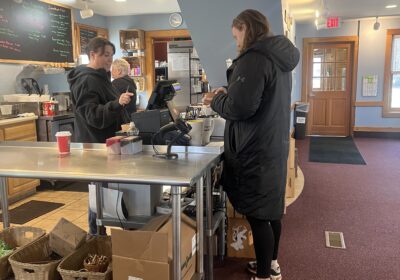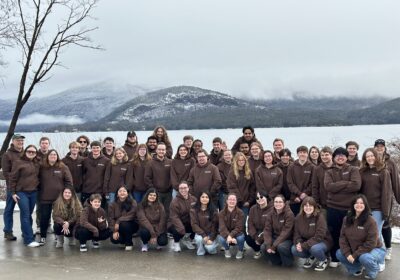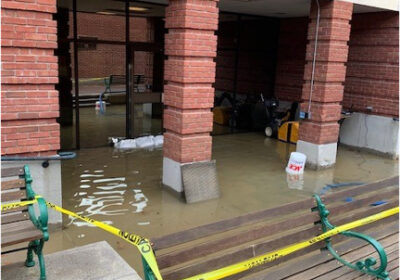An unforgiving, destructive force

Boats are knocked off their jack stands, top left.
It’s a place that brings him comfort and relaxation.
The anticipation that builds up every year is indescribable.
Just thinking about it takes him back to all of the fun he’s had from when he was a little kid to now as a young adult.
Then it’s ripped away when he hears about the damage Hurricane Irma is causing.
Castleton University alumni Matthew Lawhorn can recall his nervousness and thoughts of worry of losing his beloved summer house on Marathon Island on Key Colony Beach in Florida during the storm.
“I felt pretty defeated knowing that I couldn’t do anything for the house, and had to accept the fate that we may lose it entirely, and possibly have to start from scratch,” Lawhorn said.
Sitting and sulking in a chair outside of the team weight room facility with clear concern on his face, Lawhorn was crushed.
This is hurricane season.
Fortunately for Lawhorn and his family, their summer house only suffered a small amount of water entry into the basement, with no significant damage – a miracle to him.
“When I found out the house was okay by seeing it on a satellite viewer, I was very relieved knowing my favorite place since I was little was still there for me to visit,” Lawhorn said. “It holds a lot of memories for me, like adventures kayaking and catching my first fish. I have even been able to share these adventures and experiences with friends from home and from school by going down to Florida with them to my house.”
Lawhorn’s summer house on Key Colony Beach on Marathon Island, Florida.
Money Talks
The mental damage that a hurricane causes is almost as bad as the economic damage.
According to CNN, Hurricane Katrina in 2005 caused over $125 million in damage.
According to CNBC, Hurricane Irene in 2014 caused over $40 billion in damage.
According to Forbes. Hurricane Harvey in 2017 caused over $190 million in damage.
And most recently, according to CNBC, Hurricane Florence has already caused around $22 billion in damage.
There’s no avoiding the wrath that a disastrous storm can cause to an area. Living in the Northeast can be just as dangerous as living right off the coast of the Gulf of Mexico when it comes to hurricanes. The vicious winds that come with torrential downpours of rain bring feelings of doubt and skepticism to the area.
Effecting All Involved
As she sits on her beige leather couch in her apartment, her hands are locked in a death grip over one object – her phone.
It’s her only means of communication with her best friend.
Meg Elrick, a senior at Castleton University, waits impatiently for an update on her sister, Carissa Elrick, who lives in Charleston, South Carolina.
She was in the target zone for Hurricane Florence.
“Being from Vermont, we don’t experience storms like what they were talking this up to be,” said Carissa, who was getting excited just thinking about it. “I have always loved thunderstorms, so I was excited to experience my first hurricane, with hopes of no to minimal damage of course.”
This wasn’t your average thunderstorm though. This beast that was about to rock the Carolinas and Virginia brought concern to Carissa’s parents and her little sister.

Meg and Carissa Elrick pose for a photo.
“My parents were freaking out!” she said. “I think at one point I got seven texts in a row from my dad with news updates and screenshots, as if I didn’t have the TV on in front of me!” Carissa said.
News of the storm was having an impact on Meg too.
“I was really nervous,” she said. “I initially heard that over 1.2 million people were being evacuated from the area, so I was like, “why aren’t you leaving!?””
With concern and worry in the air, Carissa was faced with a decision to make; stay in South Carolina and brace for the storm, or head back up North to Vermont and be with her family?
“The locals made me decide to stay,” Carissa said. “The people I’ve met here who have become like family kept me well informed on what they were doing in terms of staying or going. I really based my decisions on theirs, and it ended up working out. We got lucky!”
She sure did get lucky, as her area only received heavy winds, with no rain at all. The University of Vermont graduate and financial advisor for Edward Jones does have one regret, however.
“I did regret my decision to not come up north to Vermont when I found out about Florence in the first place,” Carissa said. “Everything shuts down when a hurricane is rolling in, and even though we escaped its path this time, there was nothing that could be done in Charleston for days.”
The Expert’s Take
One of the originators of the communication department at Castleton University has experienced his fair share of storms and hurricanes. Professor Roy Vestrich is an avid kayaker and boater, and cherishes the time he gets to spend down in North Carolina and Florida on his Cape Dory 27-foot sailboat.
However, after Florence, his boat may be totaled.
The area where he keeps his boat, BridgePointe Marina in New Bern, North Carolina was “destroyed,” Vestrich said in an interview a week after the storm.
A picture he found online showed that the two boats next to his were completely off of their jack stands that hold the boat above the ground on the shore.
His baby is less than 100 yards from what he calls “the raging river.”
Vestrich was headed down to North Carolina last week to soak in the damage that may have been caused to his beloved boat.
It wouldn’t be the first time he’s had to replace a boat.
In March of 2011, a massive storm rocked Oriental, North Carolina, where he used to keep his boat.
Vestrich was in the middle of a storm with only his boxers on, trying to navigate and assess the situation as his boat was floating out of control. His eyes became bigger and bigger as he addressed his concern for not just his boat, but his life.
“I was dead in the water,” Vestrich said. “Next stop was Cuba.”

Roy Vestrich and his wife, CU professor Dawn Saunders, sailing up Delaware Bay, bottom.
Luckily, Vestrich was able to remain calm and summon the courage to get out of the dangerous predicament.
Although he was okay, his boat suffered a serious amount of damage after crashing into a bridge. A mayday call was made and 11 other boats were rescued that night.
Vestrich’s advice is much different than Carissa Elrick’s.
“Be ready to evacuate,” Vestrich said. “Don’t ride it out.”
Vestrich stressed the people need to realize how unforgiving a hurricane can be.
“It just doesn’t care,” Vestrich said. “The power of water, the power of nature, the power of wind is not to be underestimated.”






